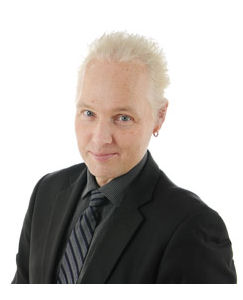
Photo submitted.
What do punk rock, environmentalism, geothermal power and technology entrepreneurialism have in common? Duane Nickull, for one. And he wants to put a new face on renewable energy.
Also known in BC’s punk rock world as Duane Chaos, Nickull has been involved in a number of tech companies including a few he started, run for the Conservatives against Christy Clark in the last provincial elections, and recently worked with the US Department of Energy on developing an open-source program to put necessary info in the hands of geothermal energy prospectors. And he’s just been named CanGEA’s Regional Policy Ambassador for BC.
The Canadian Geothermal Energy Association, a non-profit industry association dedicated to getting a geothermal power industry started in Canada, announced in December the appointment of three new positions. Duane Nickull is the new Regional Policy Ambassador for BC, Milan Seres is the Regional Policy Ambassador for Ontario, and Grant Van Hal is CanGEA’s new Policy Advisor.
“British Columbia should be and still can be a leader in the geothermal development,” says Nickull. Not only that, he says we can be developing an industry here while developing technologies that we can export worldwide to help other people become greener.
Nickull recognizes there are very few industries that don’t require tax-payer investment to kick-start. He says industry is ready to do business here in Canada and BC as soon as governments make it possible, and he hopes to help get the right people and the right information together in the province to make that happen very soon. That might mean changing legislation and changing processes to make geothermal energy more attractive for investors. But it also means solving a big problem within the geothermal sector – having the data required to do geothermal power available in one place.
Nickull explains enhanced geothermal systems, often referred to as EGS, are not just running a tube a couple meters below the ground to exchange hot and cold air to heat a building. They involve drilling narrow holes kilometers underground, pumping water through one pipe and having it come through another pipe as steam carrying the heat from surrounding materials, and using that steam to turn a turbine which produces electricity. He says doing that requires a lot of data about the material you are drilling through, to figure out how much heat you can draw at a time, and what might be in the water and steam that could affect your piping system and infrastructure. The system he worked on for the US Department of Energy, the National Geothermal Data System, puts that information in the hands of geothermal prospectors, which makes their job easier. It also includes information about nearby transmission lines and power requirements, the price of electricity, whether land is available for prospecting and suitable for the required infrastructure – all things that are very relevant for prospectors and investors.
And he was able to help convince the department the program should be open-source – which is a win for Canada, because we can use it if we choose, but also a win for the US because we can potentially add to their data.
Geothermal power can play a really interesting role here in BC, says Nickull, because it can be set up in locations that are near the points of consumption, which reduces the need for long and costly transmission lines. But it requires a change in thinking, away from the idea of huge generating stations, like the proposed Side C dam on the Peace River, towards the idea of several smaller plants feeding through smaller distribution networks. And he says BC holds the bulk of the potential in Canada for geothermal energy.
“Of all the places where things could and should be going on, BC is ground zero.”
Borealis Geopower holds the first permits for geothermal exploration in BC, in the Canoe Reach south of Valemount. They are continuing exploration for their proposed 10 megawatt geothermal plant, and Chief Operating Officer Craig Dunn says CanGEA is lucky to have Nickull on board. “Very impressive resume for Duane, from tech genius to punk bassist. He is not afraid to speak up and knows his stuff.”
Alison Thompson, president of CanGEA, says in the announcement these policy ambassadors aren’t people who need additional professional responsibilities, or employment, they are people who see potential for our country and want to help develop it. “They have offered part of their time to help launch Canada’s geothermal industry.”



